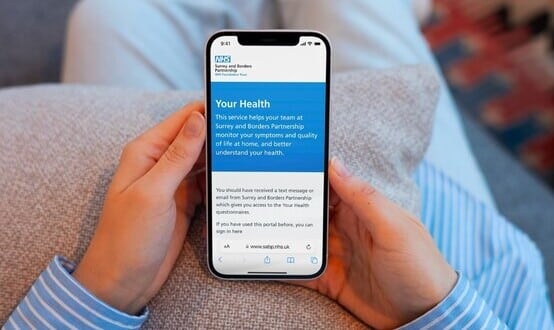New National Locator Service links paramedics to shared care record
- 28 November 2018

NHS Digital has launched a new service allowing emergency medical personnel to pull information from shared care records when called to a mental health patient in distress.
The National Record Locator Service enables paramedics and mental health nurses to find out whether the patient they are treating has a mental health crisis plan, by a means of helping inform their treatment.
In doing so, medical responders can decide whether the patient should be transported to a more appropriate care setting than A&E, or direct them to community-based care as indicated in the patient’s crisis plan.
It is hoped the service will improve the treatment of mental health patients by directing them to more appropriate care setting when possible. It is also anticipated to improve the safety of patients and staff and reduce duplicate costs within A&E departments and mental health services.
The locator service has been launched in beta as of 27 November. The first use-case partners will be North West, North East, Yorkshire and London Ambulance Services – working with their local mental health trusts; Cumbria Partnership NHS Foundation Trust, Humber NHS Foundation Trust, South London and Maudsley NHS Foundation Trust, Lancashire Care NHS Foundation Trust and Cheshire and Wirral Partnership NHS Foundation Trust.
The North West trusts will be connected to the record locator service via their shared care record systems, the Lancashire Person Record Exchange Service (Tiani Spirit) and the Cheshire Care Record (Graphnet).
Dr Gareth Thomas, who leads the Integrating Care Programme at NHS Digital, called the initiative “a brilliant example of new technology meeting the demands of a modern and forward-thinking NHS.”
He added: “The record locator represents a fantastic opportunity for health and social care information to be available at the fingertips of frontline health and care staff, wherever they happen to be.
“The service will integrate information right across the sector and will allow organisations to collaborate more closely. Direct access to records at the point of care delivery will bring huge benefit for patients, front line teams, and the wider NHS.”
While the initial focus of the National Locator Service will be mental health, NHS Digital said the scope of the service would “evolve over time” after the first use cases demonstrated their capability.
Future use-cases include end of life care, child health, maternity and cancer.
The next phase of development will see integration expanded to other Local Health and Care Record Exemplars (LHCREs), ahead of an NHS-wide roll-out.
Hadleigh Stollar, Integrating Care Programme manager at NHS Digital, said: “This is a critical milestone in the journey towards patient centred, integrated care enabled through a nationally supported and agnostic capability.
“Fundamental to this success has been the outstanding collaboration between NHS Trusts, system suppliers and the dedicated team at NHS Digital and I am personally grateful to everyone who has worked tirelessly to make this a reality”.





15 Comments
Its all a conspiracy
Are you suggesting it’s wrong for NHS organisations to share data relevant to a patients direct care for the benefit of their treatment and outcomes? I understand that’s perfectly permissible under GDPR? Stating that “NHS Digital to access and control everyone’s complete medical/life history” sounds a bit conspiracy theory to me. What if instead the idea is to host the data in a way that can be accessed, controlled and owned by citizens themselves?
“What if instead the idea is to host the data in a way that can be accessed, controlled and owned by citizens themselves?”
If you can manage to believe that, Dr Soap, good luck to you. I would say that there are two kinds of reason why that is not the idea the Government has in mind. First they are investing a lot of money in their data harvesting and processing systems (money they cannot find to invest in healthcare). One may safely infer that they expect a rich return on their investment, as indicated by Lord Mitchell in his letter to the Financial Times of 5 March. His concern was that the NHS should get the best price for “their” treasure trove of longitudinal patient data. There are a great many rich and powerful people with a vested interest in unrestricted access to patient data. This commodity is most valuable when it comes in complete data sets, precluding the possibility of patient control.
Second, the Government’s agent, NHS England, has come up with a healthcare strategy that supposedly justifies the NHS taking control of all patient data. This strategy is based on prevention and population health management. Patients are not to be allowed to determine their interactions with and course through the NHS. Rather the NHS will manage this for them, even offering unsolicited interventions. To do these they need to control both patient data and patients. This is the rationale for removing control of their data from patients. You can’t manage the population if you allow everyone to manage themselves.
Admittedly they do talk a lot about empowering patients to take control of their own health, but don’t be misled. The NHS never mean what they say. What they actually mean is that patients will be expected to look after themselves at home and play an active part in feeding their personal data to the NHS through remote monitoring devices. They certainly do not mean to allow patients to make decisions about how they interact with the NHS or what happens to their personal data. Oh no.
But there’s a difference between using identifiable data for direct care (which is what the original article is about) and the use of de-identified data for pop health. In saying that I’m all for that too. We will not have a sustainable health service or any health service at all for very long if we’re not able to better use the resources available. To do that we need the masses of data to be used in an intelligent way to inform how best to use those recourses. Make sense?
Changes need to happen. We do not live in the same world we did only 20 years ago, and in 20 years time technology, population and demographics will have moved even further placing unmanageable demands on the health service. It would be irresponsible not to act now.
The “selling” of data to external agencies for me is the more contentious issue. However if (and this is the tricky bit) it can be done in a responsible way, to companies who will use it for the good of humanity and the funds from the
sale being put back into the NHS, then it could work.
I’m open to hearing other suggestions on how population growth, an ageing population, increases in complex conditions and free at the point of care can exist without doing some of the above?
When did any patient consent to any clinical intervention which was not informed by their medical history?
The question here is whether the patient should trust the messenger. Personally, I think that would be plain stupid.
Some errors in the comments. NHS Digital is not creating a big database or sucking up data.
If a pointer is created on the nrls is between nhs trust and the patient.
If a record is requested, this is controlled by the nhs trust and can be prevented at any time (they hold the patient data, not a central organisation).
This is good Infosec practice, the record is requested only if it required which should only be if care is taking place, the data is not stored and the nhs trust has an audit of who asked for it.
Of course the cover has to be innocent. That does not say how the system will be developed, once it has been accepted that LHCRs can be accessed nationally. As I understand it, it is the LHCR that the Ambulance Trust can access, not just the crisis plan. Am I in error there? In any event, from there they will just keep on “rolling out” further developments of the system, and with NHSD in charge who knows what is really going on. They certainly won’t be telling us. NHSD don’t do transparency.
Not quite, the architecture+culture is changing from central to federated.
The central part (NHSD) is providing a central index (not data) of records. It is also providing a NHS identity service (using OAuth2 OpenID).
The federated part is:
Trusts/LHCR/Suppliers need to provide the endpoint API to supply the documents and a recommendation is currently to use https://nhsconnect.github.io/CareConnectAPI/api_documents_binary.html but you can also use a basic RESTful endpoint (but looking at #hancocks statement yesterday it MUST be FHIR).
Again trusts/lhcr/suppliers need to secure the endpoint, this is a complex subject (and this isn’t the best forum for discussion) but the suggestion is to start with OAuth2 authorisation (possibly combined with a check against a patient consent register plus links to local active directory/LDAP and NHS identity). This needs work and LHCR is probably the best place to explore this and come to a collective agreement.
Thank you, this is useful information. I do not doubt that the subject of how consent is managedconsent is complex, nor do I doubt that it will be made as completely opaque to NHS patients as to allow the NHS to do as they please with impunity. I am perfectly clear that I have no reason whatever to believe that the system will actually be consensual, or that objections of opt-outs will be honoured in the future any more than they have been in the past. The continuing resolute malintent is clear enough.
I think I agree with your sentiment but you’ll have to trust that people are working to build the system you want. Technically the easiest system to build is to give patient control of their records.
There are far too many powerful vested interests in devising a system that appears to give patients a bit of control but actually gives them no control whatever, except at the point of care. Even the NHS know that there are limits to the coercion they can get away with, even by misrepresenting data protection law. They can limit the ways in which we can engage with the health service (and are very busy doing just that) but they cannot actually force patients to accept interventions they don’t want. When it comes to our data, we are in a much weaker position because they operate the system, and they can blackmail healthcare providers to comply through their NHS contracts. They are doing that too.
Where, exactly, does patient consent come into this? I suppose one might ask more generally, where does patient consent ever come into anything if NHS Digital is involved? The mission of NHS Digital seems to be to eradicate patient consent entirely.
One would hope that the clinician who created and uploaded the mental health crisis plan would have sought and recorded explicit consent from the patient at that time, explaining how and when such information would/could be accessed, and by whom.
On 16 May 2018, Will Smart, the NHS CIO, made a speech in London as part of eHealth Week. He declared that, within about four years, the NHS would be able to “offer” complete comprehensive health and care records across all care settings, for every one of the 55 million patients in England. You can only “offer” something if that something is within your gift, that is, if you control it. Several years earlier, with Care.data running into trouble, it had been much less publicly made known that the strategy, post Care.data, would be to let local organisations win the trust of patients and establish local data pools, and then these would all be joined up to create the desired national data lake. The LHCREs are now well under way and what NHS Digital is doing is exploiting a pretext for a national system that will be able to access LHCRS. Then little by little, with the usual stealth tactics, they will take over control of Will Smart’s 55 million “complete comprehensive, longitudinal health and care records across all care settings”, and do whatever they please with them. The access of the ambulance service to the crisis plans of mental health patients is just the cover for putting in place the systems that will allow NHS Digital to access and control everyone’s complete medical/life history. Does anyone seriously think that this is going to involve consent? There may be opt-outs, but we all know about NHS opt-outs that are routinely ignored (illegally), overruled (illegally) or circumvented (illegally). The DHSC/NHS believe that they are above the law. The only reason for stealth and the covert grand plan, is that they do not want to frighten the electorate. The DHSC should be renamed the DOD (Department of Obfuscation and Duplicity. Very aptly Will Smart also declared that the NHS goal should be “quite simple to pull off”, in other words a DODDLE (DOD Deviousness and Lying Exemplar). You just need to know the code to understand what they are really saying.
Comments are closed.